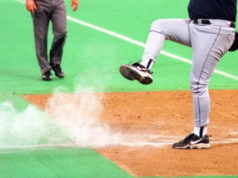Every time you take the floor or field as an official, drive a car, or even try to help someone put their bag in the overhead on an airplane, you could be setting yourself up for a lawsuit. The question is how much of a legal risk you’re taking and whether it outweighs the rewards of what you are doing. We accept the risk related to working games every time we take the court or field with our regular partners. That risk equation becomes more complicated in the rare instance when your partner doesn’t show.
If you’re faced with stands full of parents and fans and two teams ready to play without a partner to work with, your options are limited. You can either cancel or postpone the game, work the game alone, or recruit someone from those in attendance to assist you.
“Is there a Referee in the house?”
Obviously, working a game with an unqualified person who came out of the stands is more risky than working with another member of your association. The guy just helping you out probably doesn’t know the rules and is a lot less likely to watch for contact away from the play or blow the whistle you loaned him. On the other hand, since both teams agreed to have him work the game, they’ll understand. The law will only expect him to do what a reasonable person with no specialized experience or knowledge would do.
Of course, the law will expect more of you. If things go sour, you’re going to be the one asked to explain why you let things get out of hand. Consequently, there is no doubt you are at a higher risk if you work the game with Joe or Josephine Fan. However, is that additional risk enough to have you tell everyone there will be no game today because you’re short an official?
Most state governing bodies will not allow varsity games to be officiated by someone out of the stands. Needless to say, if you have that rule, you must follow it and tell everyone you are prohibited from working the game with anyone not properly registered. Failing to do so will lead to more problems. A lower-level game with limited physicality and a low potential for potentially injurious contact doesn’t present much of a legal threat. On the other hand, even a JV, junior high or rec league game can be nasty. You don’t want to have someone out of the stands help you work a game between teams that are notorious for aggressive, physical play.
Where does your game fall on that continuum? Most of our games are probably on the less threatening end of the scale. We don’t want to overthink the situation by refusing to have someone help us out calling that fifth grade, 10-minute-half, running-clock game. That said, there are going to be occasions when it’s just not a good idea. You need to use your judgment to decide if it is one of those times. If the game becomes more physical than you had anticipated, you can pull the plug and tell everyone you can’t continue with just one qualified official. That’ll probably upset everyone and may offend your “partner,” but it’s better than having someone get hurt. It’s also why it’s a good idea to err on the side of not doing the game if you have any doubts.
What's Your Call? Leave a Comment:
Note: This article is archival in nature. Rules, interpretations, mechanics, philosophies and other information may or may not be correct for the current year.
This article is the copyright of ©Referee Enterprises, Inc., and may not be republished in whole or in part online, in print or in any capacity without expressed written permission from Referee. The article is made available for educational use by individuals.
















